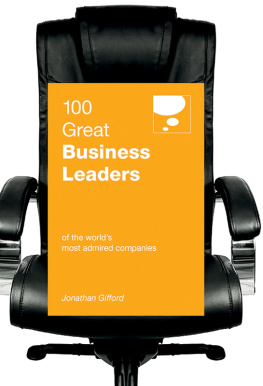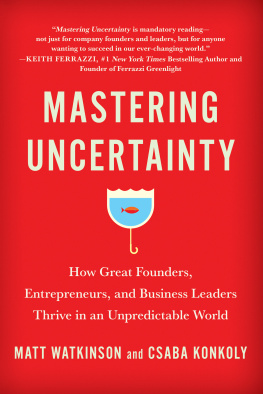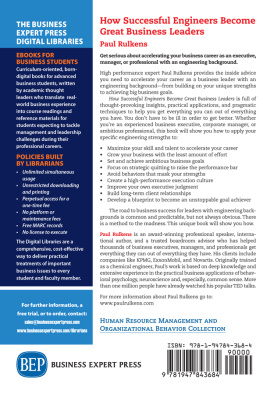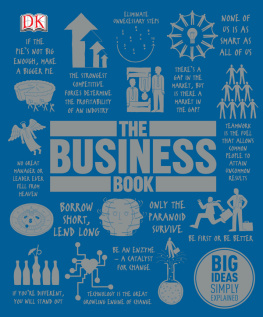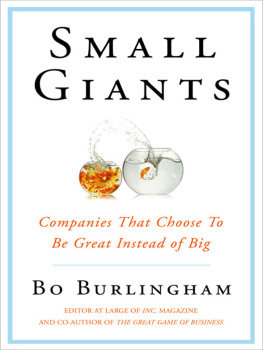
Copyright 2013 Jonathan Gifford
Published in 2013 by Marshall Cavendish Business
An imprint of Marshall Cavendish International
1 New Industrial Road
Singapore 536196
www.marshallcavendish.com/genref
Other Marshall Cavendish offices:
Marshall Cavendish Corporation. 99 White Plains Road, Tarrytown NY 10591-9001, USA Marshall Cavendish International (Thailand) Co Ltd. 253 Asoke, 12th Flr, Sukhumvit 21 Road, Klongtoey Nua, Wattana, Bangkok 10110, Thailand Marshall Cavendish (Malaysia) Sdn Bhd, Times Subang, Lot 46, Subang Hi-Tech Industrial Park, Batu Tiga, 40000 Shah Alam, Selangor Darul Ehsan, Malaysia
Marshall Cavendish is a trademark of Times Publishing Limited
The right of Jonathan Gifford to be identified as the author of this work has been asserted by him in accordance with the Copyright, Designs and Patents Act 1988.
All rights reserved
No part of this publication may be reproduced, stored in a retrieval system or transmitted, in any form or by any means, electronic, mechanical, photocopying, recording or otherwise, without the prior permission of the copyright owner. Requests for permission should be addressed to the publisher.
The author and publisher have used their best efforts in preparing this book and disclaim liability arising directly and indirectly from the use and application of this book.
All reasonable efforts have been made to obtain necessary copyright permissions. Any omissions or errors are unintentional and will, if brought to the attention of the publisher, be corrected in future printings.
eISBN 978 981 4484 68 8
Cover design by Cover Kitchen Co Ltd
Printed in Great Britain by CPI Mackays
To business men and women around the world
CONTENTS
ACKNOWLEDGEMENTS
I WOULD LIKE TO acknowledge my debt to all of the historians, authors and journalists whose work has made this book possible.
The facts about any leaders business career are reasonably easy to find, since business is carried out in the necessary glare of public scrutiny. What is harder to find, without good journalism and investigative writing, is each leaders real, personal experience: the challenges that they faced; the decisions that they made; the minor triumphs and many setbacks that lie behind any great business success. Also missing would be the leaders tone of voice. Thanks to journalists and other writers, for the great majority of leaders from the modern era, it is possible to find a quotation or comment that helps to bring the person to life.
A special acknowledgement is owed to Justin Lau, the editor of this book, for paring my original manuscript down to a manageable length with his usual flair and skill.
INTRODUCTION
THE CAREER OF ANY great business leader reads like the plot of a novel. Great leaders, by definition, have a vision that is not shared by everyone. There are difficulties and adversities to overcome; they face many obstacles, including self-doubt, but persevere in the hope of achieving their goal.
The earliest leader featured in the book, Cornelius Vanderbilt, was born in 1794. He made a living ferrying people around the waters of New York Bay in a sailing boat. When he saw the first steamboats, Vanderbilt recognised a new opportunity. He went to work for a steamboat operator to learn his trade, sometimes having to hide in a secret compartment of his boat when it was raided by officials of the New York Legislature, who had granted a monopoly of ferry services to another operator. Vanderbilt saved enough money to start his own steamboat ferry service, and finally built an empire that included ocean-going steamships. As Americans flocked to join in Californias Gold Rush in the middle of the nineteenth century, Vanderbilt offered a service to take people from the east coast of America to the western Pacific coast, steaming down the eastern seaboard and crossing the Isthmus of Panama via lakes and rivers, crossing the final stage by mule train (the Panama Canal had not yet been built). As the railways began to cross America, Vanderbilt saw a new opportunity, and acquired shares in major east coast rail services, acquiring, with great prescience, the line that served Manhattan itself. At his death, Vanderbilt was one of the richest men in America.
The most recent leader featured here was born in 1984. Mark Zuckerberg, the founder of Facebook, dropped out of university to create the new social networking site. Within a year, the new venture had attracted venture capital of nearly $14 million. A year later, Yahoo offered to buy Facebook for $1 billion. Zuckerberg turned it down. As the CEO of Yahoo at the time said, Id never met anyone who would walk away from a billion dollars. But he [Zuckerberg] said, Its not about the price. This is my baby, and I want to keep running it, I want to keep growing it.
Part of the fascination in reading about the careers of the great business leaders over the course of some two centuries is to note the similarities: the personal qualities needed to create a significant business from scratch; the skills that make a great business executive. What is also fascinating and probably more important is to see how business leadership is evolving and improving.
The characteristics that define successful leadership today are not the characteristics that would have defined previous generations of business executives, who were, in general, operating in the old command and control model of leadership adopted quite consciously by early twentieth-century business organisations. Modern leaders talk about issues like collaboration; the devolution of decision-making; creating flatter working structures where colleagues may have several leaders and may themselves be leaders in certain circumstances; the need to ensure that colleagues are genuinely excited by their work and by what their company contributes to its community. Successful modern leaders stress the need to create a working environment that encourages lateral thinking and innovation. In the modern business world, efficiency is a given inefficient businesses will quickly fail in the face of global competition. Innovation, not imitation, is what drives the wheels of progress.
Many great leaders succeed because they grasp the significance of a technological advance that will create new business opportunities. The invention of the semiconductor led inexorably to the microcomputer revolution, but required its own cadre of great leaders to make it a reality. Steve Jobs, Bill Gates, Vinod Khosla, Michael Dell and Andy Grove are featured in this book as examples of these revolutionaries.
The internet surely the most significant technological revolution of our time triggered a new business revolution, and has demonstrated how rapidly business change is accelerating. It took some 200 years to move from the age of steam to the age of cars and aeroplanes. It took ten years to move from the commercialisation of the internet in 1995 to the launch of Facebook in 2005.
While many great leaders succeed by grasping a revolution in the making, others create something out of what seems to be nothing. James Dyson decided that the world needed a better vacuum cleaner, when it was not obvious that the world was crying out for one; Romi Haan decided that South Korea (and then the rest of the world) needed a better kind of floor cleaner; Sara Blakely singlehandedly created a new type of underwear (Shapewear); Howard Schultz decided that the world needed a new kind of coffeehouse; Tony Hsieh decided that people wanted to buy shoes online. The personal qualities of such great entrepreneurial leaders emerge with great consistency: a burning conviction as to the benefits of their new idea; the strength of mind to continue in the face of criticism and rejection; great powers of perseverance, as they overcome all of the inevitable obstacles in their way; great salesmanship, as they persuade financiers, manufacturers and retailers to back their project or stock their wares.
Next page
